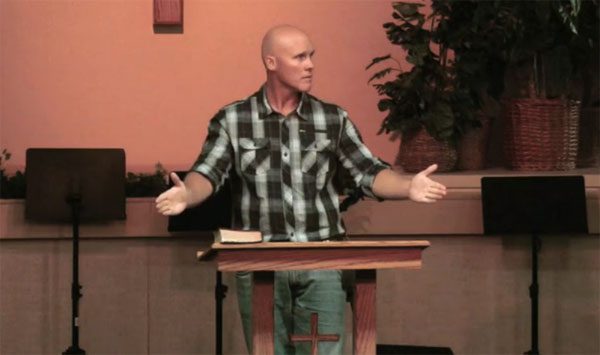
Over the last few weeks, we’ve been discussing the differences between certain religious groups. People are asking, “How do you know what religion is right? [At least Idleman admits Evangelicalism is a religion.] Who are you to say what is right or wrong?” I’m no one—please don’t take my word for it—look to God’s Word for the truth. [Idleman then spends the rest of his post NOT proving which religion is right. Like most Evangelicals, Idleman thinks quoting the Bible is evidence or proof for his claims.]
The Romans road to salvation has been very helpful during these types of conversations. It uses verses from the book of Romans to explain not only why we need salvation but how a person is really saved. All paths do not lead to heaven. Jesus said, “Enter at the narrow gate, for wide is the gate and broad is the way that leads to destruction, and there are many who are going through it” (Matt. 7:13).
1. The first signpost on the Romans Road is Romans 3:23, “For all have sinned, and come short of the glory of God.” Romans 3:10 adds, “There is none righteous, no, not one; there is none who understands; there is none who seeks after God.” We all sin and fall short—no one is innocent. Humility recognizes that we are fallible human beings who have sinned against God. His Word is a lifeline to our soul, an anchor for our lives—not something to be debated, altered or misrepresented. We don’t change truth—truth changes us.
2. The next signpost deals with the consequences of sin. Romans 6:23a says, “For the wages of sin is death …” This verse is not popular in many churches, and it is not preached from many pulpits. Telling others the punishment for sin is eternal death (separation from God) is not pleasant, marketable or palatable, but it is powerful: “It is the power of God for the salvation of everyone who believes …” (Rom. 1:16).
“To convince the world of the truth of Christianity, it must first be convinced of sin. It is only sin that renders Christ intelligible” (Andrew Murray; 1828-1917). In other words, Christ’s shed blood on the cross only makes sense in light of the consequences of sin. “Christ Jesus came into the world to save sinners” (I Tim. 1:15), yet many do not want to mention sin, repentance or judgment because it is not popular or marketable. They fail to realize that the good news about Christ can only understood with the bad news as the backdrop.
Our culture’s false perception of God as a cosmic ball of love or a doting grandfather desperately needs to be challenged. Unfortunately, difficult truths are often compromised, watered-down or avoided altogether in the hope of “not offending.” As a result, the church is a mile wide but only an inch deep: judgment is never mentioned, repentance is never sought, sin is often excused and lives are not radically changed. This leaves people confused and deceived because they believe in a crossless Christianity that bears no resemblance to Jesus’ sobering call to repentance. When we fail to proclaim God’s word faithfully, we run the risk of “encouraging sin” and “perverting the words of the living God” (cf. Jeremiah 23).
….
3. The next signpost can be found in Romans 10:9, “If you confess with your mouth Jesus as Lord, and believe in your heart that God raised Him from the dead, you will be saved.” This is how people are truly saved, delivered and set free from the bondage of sin and death. Romans 10:13 adds, “For everyone who calls on the name of the Lord will be saved.”
We hear a great deal about God’s judgment and what can keep us from heaven, and rightly so, because “the fear of the Lord is the beginning of knowledge” (Prov. 1:7). But we also need to reflect on God’s goodness, love, mercy and grace. The important question to ask is: What is the condition of your heart—has true repentance and a belief in Christ as Lord and Savior taken place?
Jesus healed my brokenness and restored my life, and He can do the same for you. If you take only one thing from this article, I hope it is this: There is a deep longing inside all of us that cannot be satisfied until we recognize our need for a Savior, repent of our sin and turn to Him. Though the road ahead may be uncertain at times, the solid ground beneath will never shift. It’s not about religion but a relationship—it’s all about Who you know.
— Shane Idleman, Charisma News, Do All Roads Lead to God — What Religion is Right?, December 28, 2016
